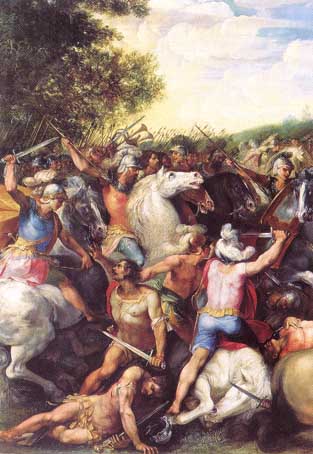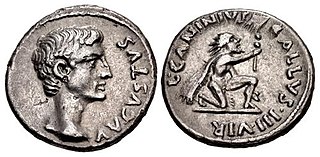During the 290s BC, Hellenistic civilization begins its emergence throughout the successor states of the former Argead Macedonian Empire of Alexander the Great, resulting in the diffusion of Greek culture throughout the Levant and advances in science, mathematics, philosophy, etc. Meanwhile, the Roman Republic is embroiled in war against the Samnites, the Mauryan Empire continues to thrive in Ancient India, and the Kingdom of Qin in Ancient China, the one which in the future will conquer its adversaries and unite China, begins to emerge as a significant power during the Warring States period.

Spurius Cassius Vecellinus or Vicellinus was one of the most distinguished men of the early Roman Republic. He was three times consul, and celebrated two triumphs. He was the first magister equitum, and the author of the first agrarian law. The year following his last consulship, he was accused of aiming at regal power, and was put to death by the patricians.

The gens Mamilia was a plebeian family at ancient Rome during the period of the Republic. The gens was originally one of the most distinguished families of Tusculum, and indeed in the whole of Latium. It is first mentioned in the time of the Tarquins; and it was to a member of this family, Octavius Mamilius, that Lucius Tarquinius Superbus, the seventh and last King of Rome, betrothed his daughter. The gens obtained Roman citizenship in the 5th century BC, and some of its members must subsequently have settled at Rome, where Lucius Mamilius Vitulus became the first of the family to hold the consulship in 265 BC, the year before the First Punic War.
Manius Tullius Longus was consul at Rome in 500 BC, with Servius Sulpicius Camerinus Cornutus.
Publius Furius Philus was a consul in 223 BC, a praetor in 216, and a censor in 214. He died the following year, before resigning his office.
The gens Curiatia was a distinguished family at Rome, with both patrician and plebeian branches. Members of this gens are mentioned in connection with the reign of Tullus Hostilius, the third King of Rome, during the seventh century BC. The first of the Curiatii to attain any significant office was Publius Curiatius Fistus, surnamed Trigeminus, who held the consulship in 453 BC. The gens continued to exist throughout the Republic, and perhaps into imperial times, but seldom did its members achieve any prominence.
Marcus Postumius, surnamed Pyrgensis, is described by Livius as a "farmer of the taxes" during the Second Punic War, whose character for avarice and fraud were equaled only by Titus Pomponius Veientanus.
The gens Carvilia was a plebeian family at ancient Rome, which first distinguished itself during the Samnite Wars. The first member of this gens to achieve the consulship was Spurius Carvilius Maximus, in 293 BC.
Spurius Carvilius C. f. C. n., later surnamed Maximus, was the first member of the plebeian gens Carvilia to obtain the consulship, which he held in 293 BC, and again in 272 BC.
Spurius Carvilius was tribune of the people at Rome in 212 BC. Together with Lucius Carvilius, he proposed that a fine of 200,000 asses be levied against Marcus Postumius Pyrgensis, for defrauding the state. Postumius was one of the "farmers of the taxes", who made their living shipping goods to Roman forces overseas during the Second Punic War. He made a habit of sabotaging his own shipments and claiming losses from these and other imaginary shipwrecks, for which he was re-imbursed by the state.
Lucius Carvilius was tribune of the people at Rome in 212 BC. Together with Spurius Carvilius, perhaps his brother, he proposed that a fine of 200,000 asses be levied against Marcus Postumius Pyrgensis, for defrauding the state. Postumius was one of the "farmers of the taxes", who made their living shipping goods to Roman forces overseas during the Second Punic War. He made a habit of sabotaging his own shipments and claiming losses from these and other imaginary shipwrecks, for which he was re-imbursed by the state.
Spurius Carvilius was sent by Gnaeus Sicinius to Rome in 171 BC, when Perseus despatched an embassy to the Senate. The Senate ordered the ambassadors to quit Italy within eleven days, and Carvilius was appointed to keep watch over them, till they embarked on board their ships.
The gens Apustia was a plebeian family at Rome during the period of the Republic. The first member of this gens who obtained the consulship was Lucius Apustius Fullo, in 226 BC.
The gens Herminia was an ancient patrician house at Rome. Members of the gens appear during the first war between the Roman Republic and the Etruscans, circa 508 BC, and from then to 448 BC. Two members of the family held the consulship, Titus Herminius Aquilinus in 506 BC, and Lars Herminius Aquilinus in 448.

The gens Hostilia was an ancient family at Rome, which traced its origin to the time of Romulus. The most famous member of the gens was Tullus Hostilius, the third King of Rome; however, all of the Hostilii known from the time of the Republic were plebeians. Several of the Hostilii were distinguished during the Punic Wars. The first of the family to obtain the consulship was Aulus Hostilius Mancinus in 170 BC.

The gens Caninia was a plebeian family at ancient Rome during the later Republic. The first member of the gens who obtained any of the curule offices was Gaius Caninius Rebilus, praetor in 171 BC; but the first Caninius who was consul was his namesake, Gaius Caninius Rebilus, in 45 BC.
The gens Sextilia was a plebeian family at ancient Rome. The first member of this gens to achieve prominence was Gaius Sextilius, consular tribune in 379 BC. None of the family obtained the consulship, but they endured throughout Roman history from the early Republic into imperial times.
The gens Verginia or Virginia was a prominent family at ancient Rome, which from an early period was divided into patrician and plebeian branches. The gens was of great antiquity. It frequently filled the highest honors of the state during the early years of the Republic. The first of the family who obtained the consulship was Opiter Verginius Tricostus in 502 BC, the seventh year of the Republic. The plebeian members of the family were also numbered amongst the early tribunes of the people.
The gens Duronia was a plebeian family at ancient Rome. Although relatively obscure, the family was of sufficient importance to hold a seat in the Roman Senate. Its members are mentioned during the first and second centuries BC.
The gens Duilia or Duillia was a plebeian family at ancient Rome. The first of the gens to achieve prominence was Marcus Duilius, tribune of the plebs in BC 470. The family produced several important statesmen over the first three centuries of the Republic, before fading into obscurity.
![]() This article incorporates text from a publication now in the public domain : Smith, William, ed. (1870). "Maximus, Carvilius (2)". Dictionary of Greek and Roman Biography and Mythology . Vol. 2. pp. 987–88.
This article incorporates text from a publication now in the public domain : Smith, William, ed. (1870). "Maximus, Carvilius (2)". Dictionary of Greek and Roman Biography and Mythology . Vol. 2. pp. 987–88.


